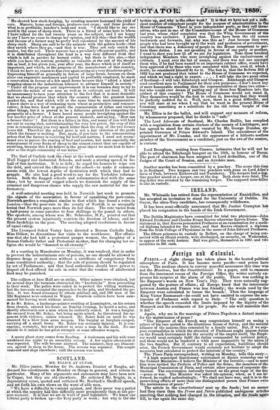SCOTLAND.
MR. ELLICE AT CUPAR.
Mr. Ellice junior, Member for St. Andrews District of Burghs, ad- dressed his constituents on Monday on things in general, and reform in particular. Many of his arguments and statements may have been new in Cupar, but they arc old elsewhere. Be criticised Mr. Bright, in a deprecatory sense, quoted and criticised Mr. Roebuck's Sheffield speech, and set forth his own views on the want of able men.
"We have a difficulty to contend against, and there never was a period at which the country had this difficulty more prominently than at the pre- sent moment. It is that we are in want of good legislators. We know our Liberal party is broken up—the Tory party is weak ; but why is the one broken up, and why is the other weak ? It is that we have not yet a suffi- cient number of competent people for the purpose of administration in the House of Commons. 'There is your independent party, as they call them- selves, who met in one of the Committee-rooms of the House of Commons last year, whose chief complaint was that the Whig Government of the country was exclusive. I grant that. There have been the old names backwards and forwards, but why was this so ? Just because they were people who had been brought up to the work and profession of government, and that there was a deficiency of people in the House competent to per- form these duties. I am not speaking in favour of one party or another, I want to show you how ill off we are for legislators. Take those hundred independent Members who were inveighing against the exclusiveness of cabinets. I went over the list of names, and there was not one amongst them who, if he had been named to an important cabinet office, would have been approved of by those who were associated with him, even if, which I doubt, he considered himself fit for it. The fact is, that the Reform Bill of 1832 has not produced that talent to the House of Commons we expected, and which we had a right to expect. . . . I will take the two great cities of Scotland—I will take Edinburgh and Glasgow. Edinburgh and Glasgow send excellent men to Parliament for their own purposes—I don't know any of more honourable standing than the representatives of these two cities— but who would ever dream of putting any of these four Members into the cabinet of this country ? The House of Commons would not stand it. They themselves would be the first to refuse it, knowing that they would be perfectly unfitted for it. Well, now, there is a great difficulty, and you will stare at me when I say that we want in the present House of Commons something as a substitute for the old rotten burghs of this country."
Mr. Ellice is for the ballot, and will support any measure of reform, by whomsoever proposed, that he thinks is "safe." The Lord Advocate of Scotland, Mr. Charles Baillie, has complied with a requisition from certain electors of the county of Linlithgow, and has agreed to stand for the seat vacated by Mr. George Dundee, ap- pointed Governor of Prince Edward's Island. The coincidence of the appointment of Mr. Dundee, and the appearance of a hitherto seatless member of the Government as a candidate, just on the eve of the session, is curious.
Lord Brougham, writing from Cannes, intimates that he will not be able to attend the Edinburgh banquet on the 25th, in honour of Burns. The poet of chairman has been assigned to Lord Ardmillan, one of the Judges of the Court of Session, and an Ayrshire man.
Another murder has been committed by a poacher. The scene this time is in Scotland. Two keepers saw two poachers with guns on Lord Ailsa's farm of Park, between lfirkoswald and Turnberry. The keepers had a dog. One poacher aimed at a keeper, one at the dog. Roth shots were fatal. The dog-killer was arrested by the remaining keeper. The supposed anon-killer is also in custody.






























 Previous page
Previous page